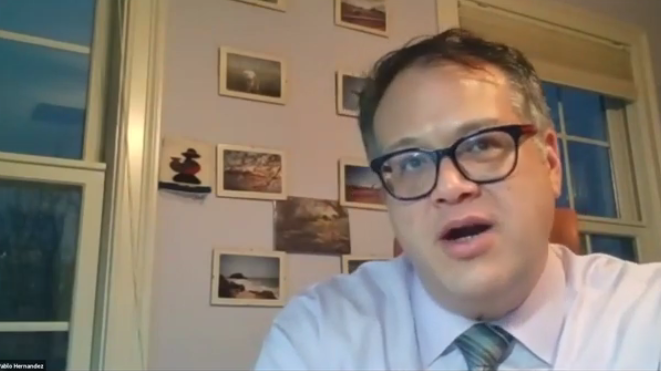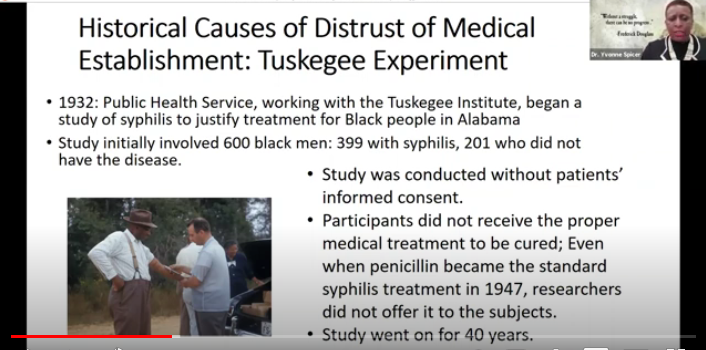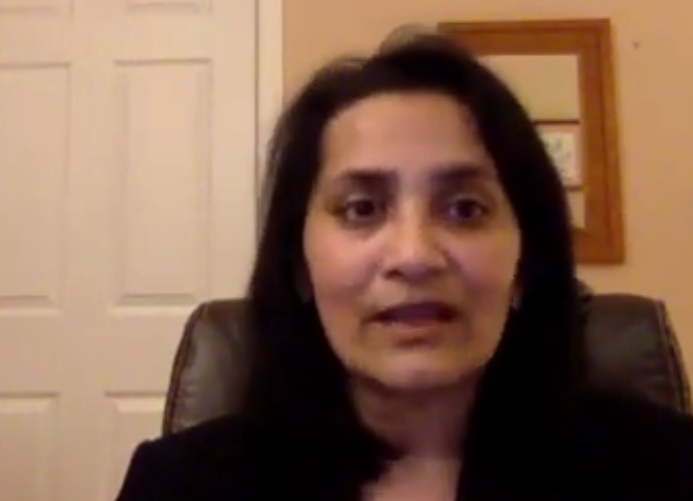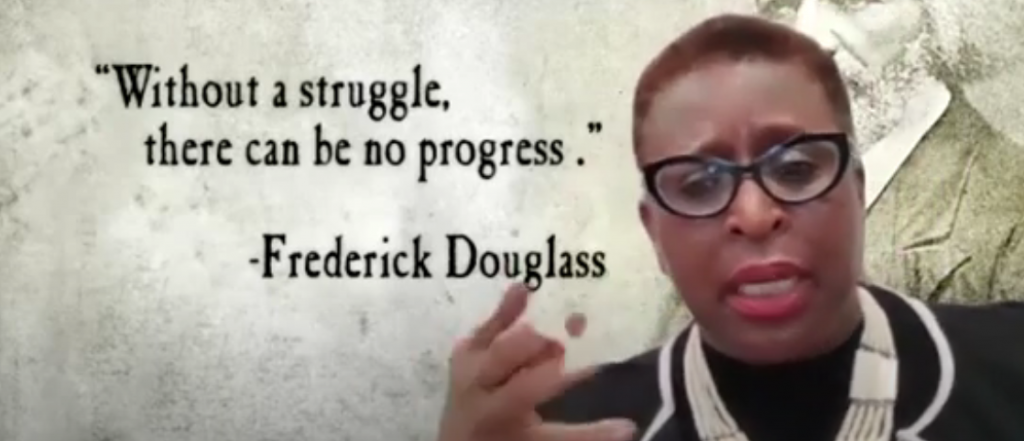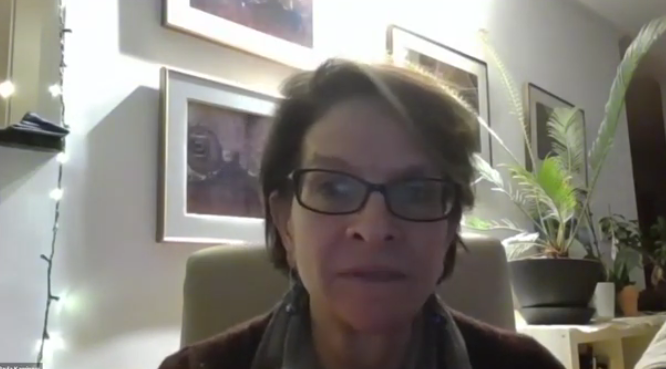By Talia Heisey
***

FRAMINGHAM – While the COVID-19 vaccine is in many ways highly accessible, there are many communication, historical, and physical barriers which exist that prevent minorities and underserved communities from receiving it.
Yesterday’s February 16 community hour with Framingham Mayor Yvonne Spicer and three members of Framingham’s medical community sought to address these issues from the perspective of marginalized groups.
Mayor Yvonne Spicer explained the vaccine’s accessibility, “you do not need to have insurance to get a vaccination…Nor do you need to be a documented resident… undocumented residents can get a vaccination…we’re trying to get this for all Massachusetts residents, not just certain subsets of groups of people”
Spicer displayed an update on Covid-19 data including fatalities, at the start of the meeting. Yet, it did not include any information about how BIPOC (black, Indigenous and people of color) individuals in Framingham were being affected by the virus. Nor did the Mayor state how many members of underserved communities had been vaccinated so far in Framingham.
The most Mayor Spicer acknowledged about the diversity of Framingham Constituents getting vaccinated was in the middle of the forum, when she said, “as I talk to my colleagues across the state, that the vast majority of the folks that have been accessing these clinics have been largely highly educated white, and oftentimes don’t reflect the community or where the greatest need has been in the community. I can say that is has been true for Framingham, you know, a little bit better this past week in terms of a diverse population coming in, but still clearly not nowhere near the the percentage of people that is reflected in our community.”
[broadstreet zone=”59945″]
The City of Framingham Mayor continued by providing an overview of the city’s programs designed to help underserved, at risk including the Commonwealth of Massachusetts’s Beacon Project which provides free testing, the state’s 2-1-1 line, where people who do not have internet access can register to be vaccinated, and the Framingham health department.
Spicer also mentioned the City is in the process of developing a walk up testing site as well as “looking at transportation and making sure more people can get to some of these vaccination sites.”
Although the vaccines was the focus of the hour, as of Tuesday at 5 pm, Spicer did not have any information on the next allotment of vaccines. “Hopefully we will have information about the number of doses that we will have available within the next couple of day,” adding “I have talked to colleagues in other communities and where they had anticipated getting vaccines they have received none…we are at the will of the state,” she said.
Shifting more towards the topic at hand, Mayor Spicer addressed present misconceptions about the vaccine and the past injustices against BIPOC communities throughout America’s history.
[broadstreet zone=”59948″]
Community Hour panelists Paula Kaminow, of the Edward M. Kennedy Health Center, which has a location in downtown Framingham, acknowledged side effects could be a concern. “Sometimes people do have some side effects, we just want to make sure that people are prepared so that they know what to do … particularly for our older population, that there’s someone there that can support them, that they’re not overly alarmed by some of the reactions that they have,” she said.
The trust in the healthcare system, which is critical for getting underrepresented groups, was greatly impacted by two historical injustices, said Mayor Spicer, who mentioned the Tuskegee Experiment where “African American people that were experimented on for over 40 years.”
“It certainly put a very bad feeling around medical treatment and the medical profession, you know, particularly in the African American community” Spicer said.
Spicer ended her opening 15-minute presentation by asking, “How do you rebuild that trust? How do you rebuild that sense of …that this is something that’s going to be good for us?”
This sentiment was mirrored by Dr. Sowmya Viswanathan, Chief Medical Officer of MetroWest Medical Center, which is located in Framingham.
[broadstreet zone=”59946″]
“I have first hand experience on some of the challenges we encountered there. Similar to what Mayor Spicer was, was encountering here about the framing and experience. It’s exactly [the same] in most places, where we have to figure out every day, every week, what challenges we are encountering and see how we can help the entire community to get this vaccine, which is so important for us,” she said.
Kaminow emphasized the role of her medical center, the Edward Kennedy Community Health Center in the community.
“We want to be part of the community and really address some of the unmet needs of the members of the community that we serve” she said.
The remainder of the hour then transitioned to community leaders discussing with Spicer their commitments to the health of the community and practices for connecting with members of underserved communities.
Spicer first introduced Dr. Pablo Hernandez, the Chief Medical Officer at the Edward M. Kennedy Health Center. He is a immigrant to the United States from Venezuela. Framingham is home to a large immigrant population from Central and Latin America.
One of the first statements Dr. Hernandez made was “it is my job to reassure everyone about the importance of access to care.”
Dr. Hernandez continued by discussing his “personal hesitation to get the vaccine … What I did is having access to the science, look at it, study it, and realize that … this is a good vaccine is not a technology has been there for over 10 years, we just happen to be in the middle of a pandemic. So we were able to try and test it worldwide and prove that it works. Hence, I didn’t hesitate to get vaccinated when it was allowed.”
Dr. Hernandez later added he was trying to get his son, 12, vaccinated as soon as possible too.
[broadstreet zone=”59984″]
The panelists discussed the important of sharing personal experiences of receiving the vaccine as a way to alleviate individuals worried about the vaccine. The panelists frequently mentioned personal experience as an important method of communicating the vaccine’s effectiveness and safety.
“One of the one of the most important ways of really communicating is by sharing our own experiences about getting the vaccine and our positive experiences,” Dr. Viswanathan said.
Another important form of outreach within communities themselves is “the people who have been vaccinated [at the clinic],” said Dr. Viswanathan. “We actually have urged them to go back into their own communities and sort of spread the word not to have gatherings, but sort of pick up the phone and just call your neighbor and let them know that I got my vaccine today.”
Accessibility and clear communication has been key for the Kennedy Health Center’s rollout of the vaccine for it’s 75-plus population, Kaminow said.
“Rather than trying to do something that was challenging for patients, we have run reports of our patients over a certain age and done outreach to them. So that they are people that that our patients know, calling them to talk to them about coming in to get the vaccine,” she said.
“I think [it’s] really critical when we’re talking about the vaccine is that some of the outreach … has to come from the people, that members of the community trust,” said Kaminow.
Dr. Viswanathan broadened this idea of sharing vaccinated experiences to how to reach out to minority communities, saying, “if you look at any kind of community endeavor, which involves people of color, we have to go to their locations for us to deliver that message.”

Screenshots from the presentation
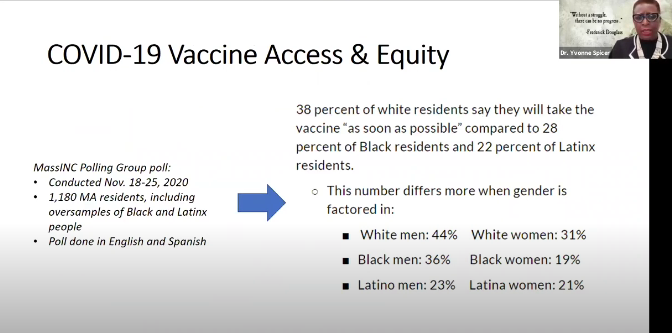
You can watch the entire hour here:
***
Talia Heisey is a 2021 spring intern for SOURCE. Heisey is a current sophomore at the University of Massachusetts Amherst, pursuing a bachelor’s degree in journalism and English. They has been a contributor to the Amherst Wire’s campus news section since 2019, focused on covering the impact of COVID upon the UMass community. They has previously participated in the Center for Strategic and International Studies’ Journalism bootcamp program.

